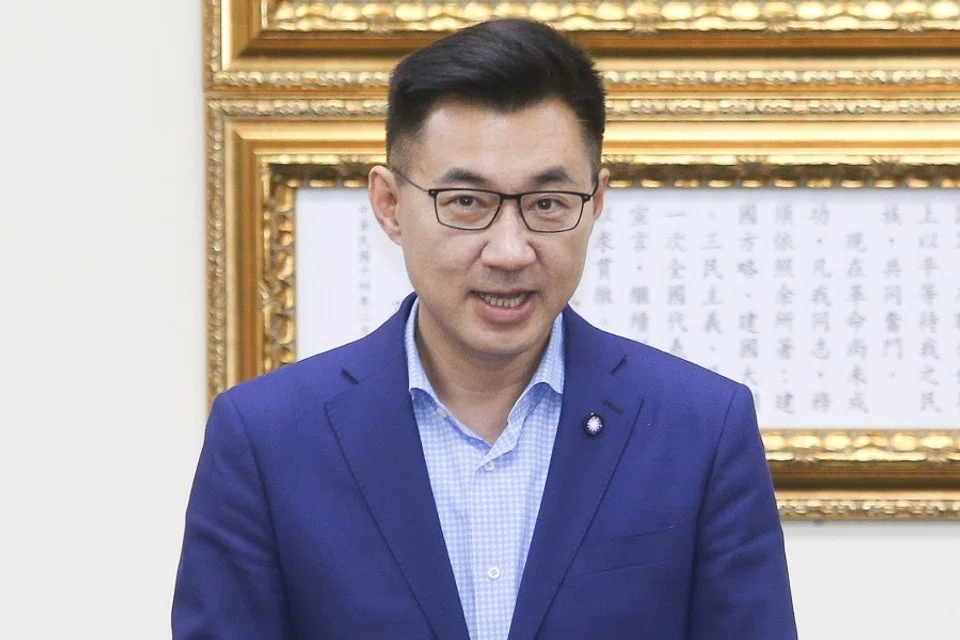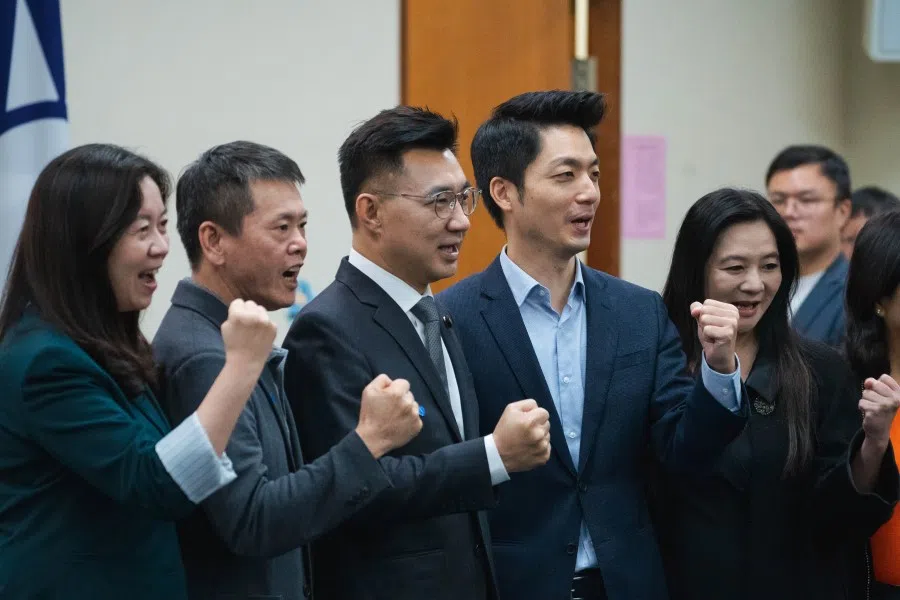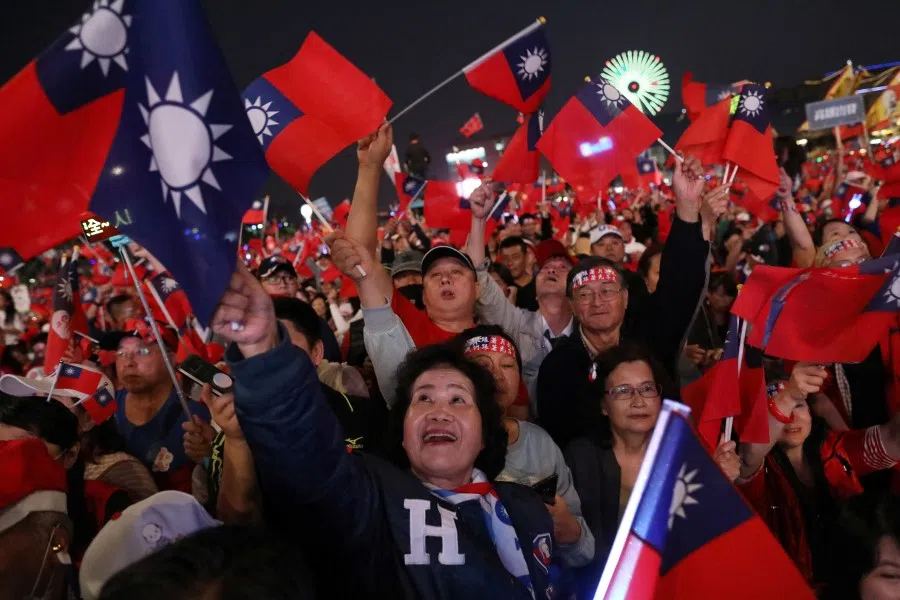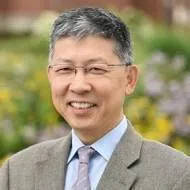Fresh, young, pragmatic chairman of Kuomintang signals new hope for Taiwan?
All eyes are on Johnny Chiang, the 48-year-old who was elected the new chairman of Taiwan's Kuomintang. Chiang won all the elections he stood for in 2012, 2016, and 2020, and was the KMT Legislative Yuan member with the most votes in the 2020 general election. Political scientist Zhu Zhiqun says Chiang is, without a doubt, the most suitable candidate to be KMT chairman right now. But what are the challenges faced by the ailing party under new leadership, and the implications these may have on cross-strait relations?

On 7 March, 48-year-old Johnny Chiang Chi-chen (江啟臣) was elected the new party chairman of Taiwan's Kuomintang (KMT). A member of Taiwan's Legislative Yuan, Chiang won 68.8% of the votes to defeat KMT deputy chairman Hau Lung-bin. Speaking after his win, Chiang thanked all KMT members regardless of how they voted, and promised to work hard over the next 14 months to take on the heavy burden of reform to regain the pride of the KMT.
Chiang said he would implement the KMT redesigns that he raised in his campaign in the shortest time possible, in the areas of party reforms, future direction, and talent policy. Bearing in mind KMT founding father Sun Yat-sen's Three Principles of the People (三民主义, often summarised as nationalism, democracy and socialism), Chiang promised to lead the KMT towards becoming a democratic party that is close to the people, to safeguard the Republic of China and rejuvenate the Chinese people. He did not mention cross-strait relations in his speech.
As a member of the Legislative Yuan for Taichung, Chiang won all the elections he stood for in 2012, 2016, and 2020, and was the KMT Legislative Yuan member with the most votes in the 2020 general election.
Clearly, Chiang's focus is on the KMT's internal reforms. He wants to revive the KMT, which is the first political party in all of Chinese societies to implement democratic politics, and lead it towards regaining ruling powers in Taiwan. Unfortunately, Chinese Communist Party (CCP) general secretary Xi Jinping did not send the usual congratulatory cable, but conveyed through a Taiwan Affairs Office spokesperson that cross-strait relations are currently complex and difficult. The message is for the KMT under Chiang's leadership to cherish and safeguard the existing political basis of the two-party system including the 1992 Consensus, to reject the idea of independence for Taiwan, to be a bridge of cross-strait communication, and to work to maintain peace and stability in the Taiwan Strait as well as the good of the people.
The next day, Chiang said he respected mainland China's decision to withhold the call, but this would not affect the Blue camp's reforms. He said the KMT's cross-strait and international policy had always been to get along with mainland China, be pro-US, and be friendly with Japan (和中、亲美、友日). As KMT chairman, he would actively rebuild Taiwan's good relations with its major international partners as well as mainland China. Chiang's comments seem to be aimed at removing mainland China's doubts about his cross-strait policy.
The CCP should work with the KMT in actively supporting Chiang's reform efforts. If the KMT cannot rally itself, it will be further marginalised and lose the support of the Taiwanese people, especially young people.

Chiang was born in 1972 in Fengyuan, Taichung. He graduated from National Chengchi University and got an overseas scholarship, completing his PhD in International Studies at the University of South Carolina. On his return, he taught politics at Soochow University and was the director of the Department of International Affairs at the Taiwan Institute of Economic Research. In 2010, at the age of 38, Chiang was recruited by Ma Ying-jeou's administration to head the Government Information Office of the Executive Yuan. As a member of the Legislative Yuan for Taichung, Chiang won all the elections he stood for in 2012, 2016, and 2020, and was the KMT Legislative Yuan member with the most votes in the 2020 general election. Without a doubt, Chiang is the most suitable candidate to be KMT chairman right now.
The KMT's choice of a fresh, young, pragmatic chairman brings new hope for reviving the current state of deteriorating cross-strait relations. Both mainland China and Taiwan hope to maintain peace and stability of the Taiwan Strait, and so mainland China has expectations of the KMT, which has always supported peaceful cross-strait relations.
The KMT is still adjusting its cross-strait policy, and we cannot be prejudiced or put too much pressure on Chiang. The CCP should work with the KMT in actively supporting Chiang's reform efforts. If the KMT cannot rally itself, it will be further marginalised and lose the support of the Taiwanese people, especially young people. A strong KMT with the support of the people will have more confidence in handling and bringing new hope to cross-strait relations.
Taiwan, including the KMT, is in a time of transition. Gaining the support of young people is the key to the KMT's resurgence. Currently, few people aged below 40 vote for the KMT in various elections in Taiwan, leading people to wonder if an ageing KMT is still worth voting for. According to a study by Taiwanese academics, during the presidential election in January, 72% of voters below 40 voted for Tsai Ing-wen. Self-identity is strong in Taiwan, and young people generally do not think of themselves as China Chinese (中国人) and are not clear about the 1992 Consensus, while Taiwan's major political parties are also resistant to being labelled as "pro-China".
But while some KMT members still support the 1992 Consensus, most members, especially the younger ones, think they should review the narrative on the cross-strait issue and rethink cross-strait cooperation.
From his previous comments, Chiang is pragmatic and cautious when it comes to cross-strait issues. After the 2018 Taiwanese local elections, Chiang said the fact that Kaohsiung mayor Han Kuo-yu won by 150,000 votes in a city where the "1992 Consensus" could not be mentioned, showed that the political status of Taiwan was a false proposition (统独是假议题). He said the Democratic Progressive Party (DPP) spoke of maintaining the status quo and advocated independence for Taiwan, but it did not really dare to push for it when in office; the KMT spoke of the 1992 Consensus, but had never pushed for unification while in charge.
Chiang said, "Both parties talk about unification and independence, but frankly, when it comes to actually doing something, it's all the same." He felt that most Taiwanese want peaceful and safe cross-strait relations, so that they can have good lives. The issue of sovereignty is not unimportant, but there may not be an ultimate solution in their lifetime, so it would be better to leave it aside for now rather than go in circles.

In recent years, the DPP has twisted the 1992 Consensus to mean "one country, two systems", so that most Taiwanese do not accept the 1992 Consensus. At a session in February to present his platform for the KMT chairmanship, Chiang said the consensus of 1992 was made a long time ago, and incidents such as the anti-extradition protests in Hong Kong as well as the Covid-19 outbreak have led to increasing mistrust among the Taiwanese for mainland China, and affected support for the 1992 Consensus and the KMT. But while some KMT members still support the 1992 Consensus, most members, especially the younger ones, think they should review the narrative on the cross-strait issue and rethink cross-strait cooperation. These challenges reflect the situation in Taiwan at large, and the fact that Chiang sees all the difficulties and dares to face them head-on shows his pragmatism.
... the CCP should invite Chiang to mainland China to meet the CCP leaders...
It must be noted that since the KMT is now in the opposition, a change in its chairman will have limited short-term impact on cross-strait relations. But mainland China can take this opportunity to adjust its policy towards Taiwan and be more in tune with Taiwan people. It should cheer on the KMT's efforts to reform itself and appeal to young people, in order to give the KMT a chance for a resurgence. Of course, the DPP is the current ruling party in Taiwan. If mainland China wants a quick breakthrough in cross-strait relations, it will have to gain goodwill by being flexible in its interactions with the DPP while holding to its principles, and reach a new consensus acceptable to both sides through negotiation and discussion.
When it comes to cross-strait relations, mainland China should look to the future. At an appropriate time, the CCP should invite Chiang to mainland China to meet the CCP leaders and build a basis for good dialogue and a channel of communication. However, the key is on how mainland China will continue to build its domestic affairs and institutions and go on to become more attractive.





